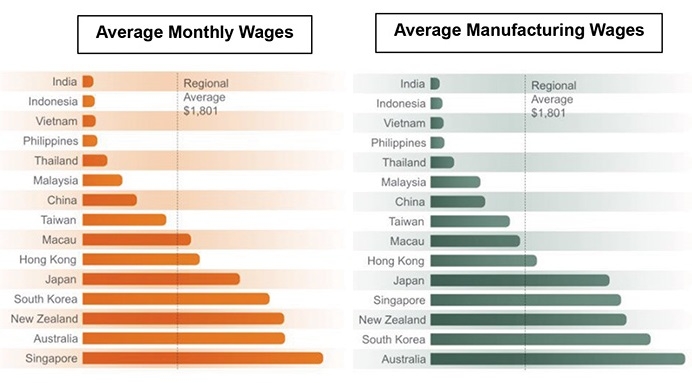Answers required for skilled labour scarcity
 |
| Source: ManpowerGroup |
Tri Dat JSC, a private company providing services and ancillary products in aluminum casting and metallurgy for 10 years in Hanoi, has been trying to recruit an electric engineer for several months.
“Preparing for the expansion plan, we intended to recruit one more electrical engineer, but it’s not simple. We have received dozens of applications, many of which are good ones but we cannot recruit because their abilities are limited. Some of them were chosen but after a trial period we have had to end the contracts,” Nguyen Dinh Chi, the company’s deputy director, told VIR.
According to Chi, in his company’s field the electric part is crucial, so he would like to build a professional team for this. “It’s easy to find many electrical engineers but it is really hard to find those that are skilled to the required level,” Chi said. “We used to recruit one engineer who had good vocational skills but lacked in soft skills. It is a common situation in the labour force in our country.”
Sharing the same difficulties, audio and lighting group Viet Hung JSC, has also struggled to track down a professional website administrator.
“This role requires an IT engineer to be quick and creative. It will take us months, even years to train newly-graduated students to be able to work. But after that, they often soon quit the job to find a bigger company or foreign-invested enterprise (FIE) to work with,” director Le Manh Quan told VIR.
According to Quan, the quality of newly-graduated students now is low. “They do not identify their position and ability, and always have the thought that the grass is greener on the other side,” he said.
Discussing Vietnam’s labour force, a representative of the Japan External Trade Organization said that the country is facing a lack of engineers due to the sheer amount of FIEs and other manufacturers. However, many Vietnamese who have worked as technical trainees or high-tech specialists in Japan return to Vietnam yet struggle to utilise their skills here.
“It is important to improve the working environment for those who have acquired skills abroad to be able to effectively apply this experience after returning home,” the representative said.
In its Total Workforce Index 2019 report released recently, ManpowerGroup, a global workforce solutions company, revealed that Vietnam ranked 57th across the globe (versus 43rd in 2018), and 13th across the Asia Pacific region (compared to 12th in 2018) for sourcing, hiring, and retaining a skilled workforce.
According to the index, the average monthly wage of the Vietnamese workforce is about $240 per month, while manufacturing wages are around the same, as compared to the regional average of $1,800 per month.
The report also pointed out that the Vietnamese highly-skilled workforce in 2019 made up 11.6 per cent of the local total workforce of 57.5 million, an increase from 10.8 per cent the previous year. The Vietnamese permanent workforce accounts for 41 per cent, while the local contingent workforce is responsible for 57 per cent of the total number.
“In an increasingly complex global market, access to skilled talent is a priority for organisations looking to build or grow their business,” said Simon Matthews, country manager of ManpowerGroup in Vietnam, Thailand, and the Middle East.
According to Matthews, in order to support enterprises, Vietnam is required to promote vocational training and also improve education generally.
What the stars mean:
★ Poor ★ ★ Promising ★★★ Good ★★★★ Very good ★★★★★ Exceptional
 Tag:
Tag:
Related Contents
Latest News
More News
- Kurz Vietnam expands Gia Lai factory (February 27, 2026 | 16:37)
- SK Innovation-led consortium wins $2.3 billion LNG project in Nghe An (February 25, 2026 | 07:56)
- THACO opens $70 million manufacturing complex in Danang (February 25, 2026 | 07:54)
- Phu Quoc International Airport expansion approved to meet rising demand (February 24, 2026 | 10:00)
- Bac Giang International Logistics Centre faces land clearance barrier (February 24, 2026 | 08:00)
- Bright prospects abound in European investment (February 19, 2026 | 20:27)
- Internal strengths attest to commitment to progress (February 19, 2026 | 20:13)
- Vietnam, New Zealand seek level-up in ties (February 19, 2026 | 18:06)
- Untapped potential in relations with Indonesia (February 19, 2026 | 17:56)
- German strengths match Vietnamese aspirations (February 19, 2026 | 17:40)






















 Mobile Version
Mobile Version